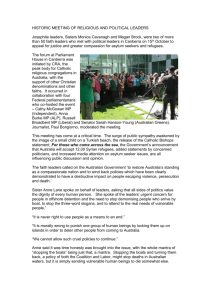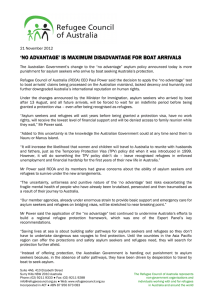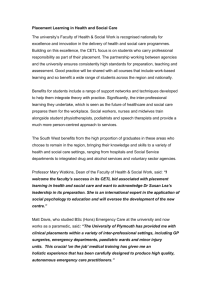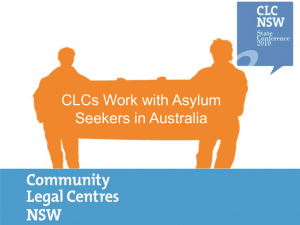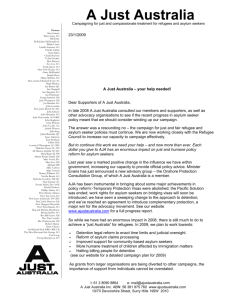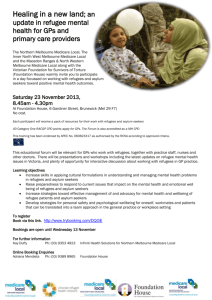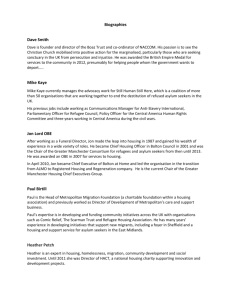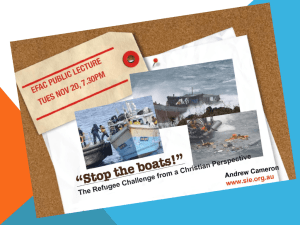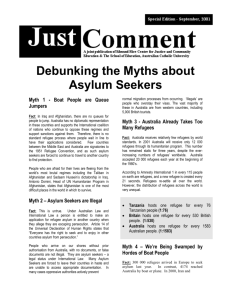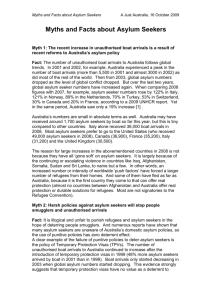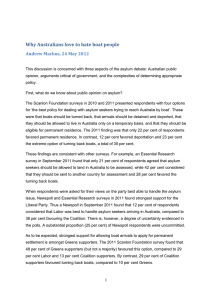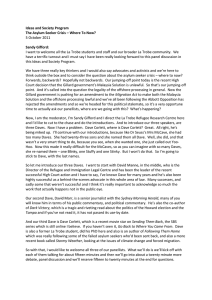Word - Australian Catholic Social Justice Council
advertisement
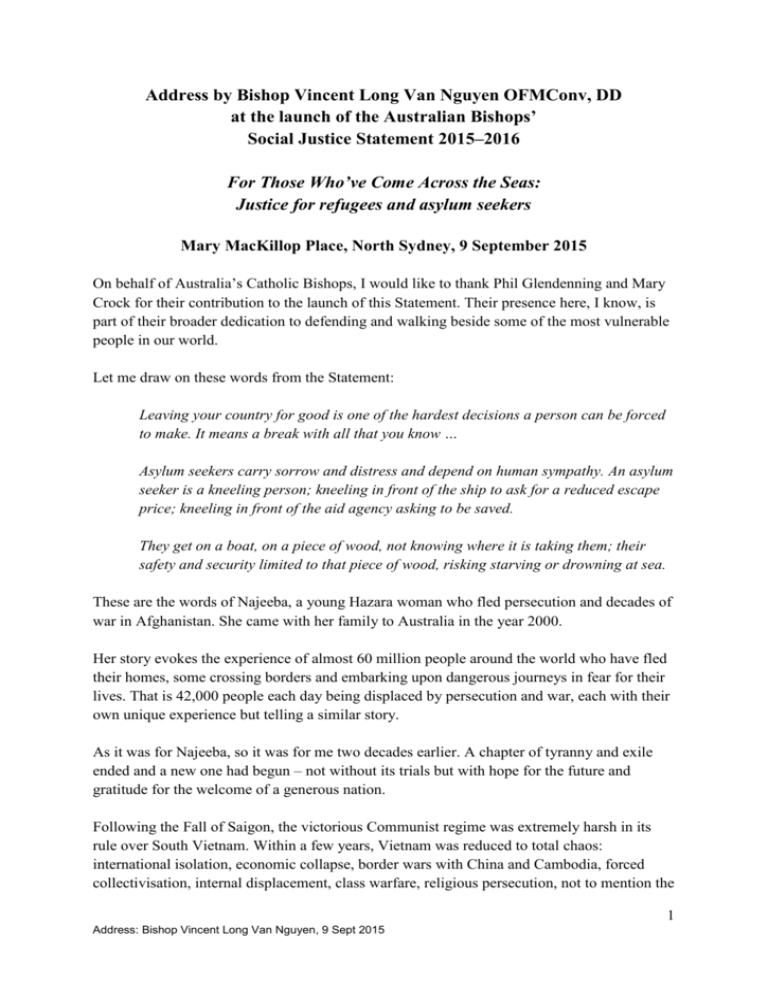
Address by Bishop Vincent Long Van Nguyen OFMConv, DD at the launch of the Australian Bishops’ Social Justice Statement 2015–2016 For Those Who’ve Come Across the Seas: Justice for refugees and asylum seekers Mary MacKillop Place, North Sydney, 9 September 2015 On behalf of Australia’s Catholic Bishops, I would like to thank Phil Glendenning and Mary Crock for their contribution to the launch of this Statement. Their presence here, I know, is part of their broader dedication to defending and walking beside some of the most vulnerable people in our world. Let me draw on these words from the Statement: Leaving your country for good is one of the hardest decisions a person can be forced to make. It means a break with all that you know … Asylum seekers carry sorrow and distress and depend on human sympathy. An asylum seeker is a kneeling person; kneeling in front of the ship to ask for a reduced escape price; kneeling in front of the aid agency asking to be saved. They get on a boat, on a piece of wood, not knowing where it is taking them; their safety and security limited to that piece of wood, risking starving or drowning at sea. These are the words of Najeeba, a young Hazara woman who fled persecution and decades of war in Afghanistan. She came with her family to Australia in the year 2000. Her story evokes the experience of almost 60 million people around the world who have fled their homes, some crossing borders and embarking upon dangerous journeys in fear for their lives. That is 42,000 people each day being displaced by persecution and war, each with their own unique experience but telling a similar story. As it was for Najeeba, so it was for me two decades earlier. A chapter of tyranny and exile ended and a new one had begun – not without its trials but with hope for the future and gratitude for the welcome of a generous nation. Following the Fall of Saigon, the victorious Communist regime was extremely harsh in its rule over South Vietnam. Within a few years, Vietnam was reduced to total chaos: international isolation, economic collapse, border wars with China and Cambodia, forced collectivisation, internal displacement, class warfare, religious persecution, not to mention the 1 Address: Bishop Vincent Long Van Nguyen, 9 Sept 2015 proliferation of the so-called ‘re-education camps’ where thousands of soldiers, officials and anyone suspected of working for the former government were imprisoned. It was déja vu for my parents who had experienced communist cruelty in the north and had made a dangerous boat journey south. Twenty years later, it would be my turn to follow their footsteps. I joined what turned out to be the biggest, the most tragic and the most unprecedented exodus in our history. More than 2 million Vietnamese left their homeland mostly on rickety unseaworthy boats. Thousands did not make it. I was one of the lucky ones. I survived the 7 day ordeal on the Pacific and after 16 months in a refugee camp in Malaysia, I was brought to Australia. I consider it my vocation to be the voice of those seeking freedom and dignity. My episcopal motto “go further into the deep” is in part meant to honour the memory of my people who suffered and died in the pursuit of freedom and dignity. How many more have shared such a story? Around 25 per cent of Australians were born overseas and a further 20 per cent have at least one parent born overseas. Over 50 per cent have one or more of their grandparents or earlier generations settling in Australia. Most have stories of the search for a better life. But there are also stories of the flight from war and oppression, displacement and the search for compassion – relying on the generosity of strangers. Think of the parents and grandparents arriving as refugees and migrants following the Second World War. Go back further to consider the deportation of British convicts to these shores. As we stand here today, acknowledging the Cameraigal People, we recall that our own history includes episodes of cruelty and persecution: the dispossession and displacement of the First Peoples of this Land. When considering these stories of displacement, we focus on the most recent arrival of asylum seekers who are fleeing to Australia by boat. These people are now intercepted at sea and turned back, or sent to offshore detention facilities, or returned to the countries they fled. Over recent years, Governments of both persuasions have introduced harsh policies based on deterrence and detention, to stem a feared increase in boat arrivals. But in 2013, at the height of arrivals, the numbers arriving amounted to about 20,000 people. We need to put this into perspective. If the global number of people fleeing their homes and crossing borders constituted a nation, they would be the population of Italy or the United Kingdom. It seems our nation’s focus on the deterrence of boat arrivals has closed our minds to the tens of millions who are displaced. It seems our costly policies of intercepting boats and detaining people offshore have diverted our attention from the true picture of the asylum seekers’ journey and the reasons they take it. To my mind, we cannot approach the issue of refugees and asylum seekers without reference to the broader context of justice and solidarity. Australia is and will continue to be a magnet for them as long as there is an extreme chasm between where we are and where they are on the political and socio-economic spectrum. We need to approach the issue as primarily a 2 Address: Bishop Vincent Long Van Nguyen, 9 Sept 2015 humanitarian and justice issue rather than merely a political one. In the last analysis, refugees and asylum seekers challenge us to consider their plight and the global inequality on the one hand, and on the other, our privilege of enjoying some of the best living conditions on the planet. Can we go on protecting our way of life with little interest in or regard for them? Can we continue to secure our privilege as our exclusive right without confronting injustice in the world? This Statement by the Catholic Bishops of Australia calls for a new response to the plight of asylum seekers – one that honours our nation’s history of assisting the innocent victims of conflicts and upheavals who come seeking asylum. The intention of the document is not political, ideological or theoretical. It is not aimed at a particular side of politics. It is focused squarely on the reality and the human dignity of fellow human beings – our brothers and sisters in need. We need to become reacquainted with their story and to bring that story out from behind the veil of secrecy. The accounts of the atrocities they are fleeing will shock us. So will some of the conditions they endure along the way – including those faced by men, women and children in detention centres on Manus Island and Nauru. Australia, like every other nation, has the right to regulate migration flows and assess the status of people seeking protection within its borders. And, certainly, we should be working to stop people smuggling and preventing deaths at sea. However, these concerns must not lead us to treat asylum seekers and refugees with cruelty, harshness and injustice. I remember with pride the Australia that rose to the challenge in the past with its generous embrace of migrants and refugees. It proved itself especially courageous during the Indochinese exodus and accepted an unprecedented number of Asian refugees. Australia changed for the better as it always has with each successive wave of new arrivals. Australia is what it is today because of their determination and drive for a better future. We honour the legacy of this great nation not by excessive protectionism, isolation and defence of our privilege at all costs. Rather, we make it greater by our concern and care for asylum seekers in the spirit of compassion and solidarity. Pope Francis has constantly appealed Christians and people of good will to address the issue of refugees and asylum seekers as matter of justice and compassion. He writes on World Day of Migrants and Refugees as follows: The Church contributes to overcoming frontiers and encouraging the “moving away from attitudes of defensiveness and fear, indifference and marginalization … towards attitudes based on a culture of encounter, the only culture capable of building a better, more just and fraternal world” 3 Address: Bishop Vincent Long Van Nguyen, 9 Sept 2015 In commending this Statement to you, I pray that Australia will begin again to recall and recount our shared story of those in exile finding the safety and hospitality of a welcoming nation. 4 Address: Bishop Vincent Long Van Nguyen, 9 Sept 2015
